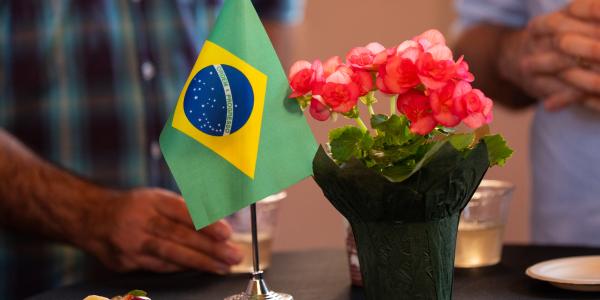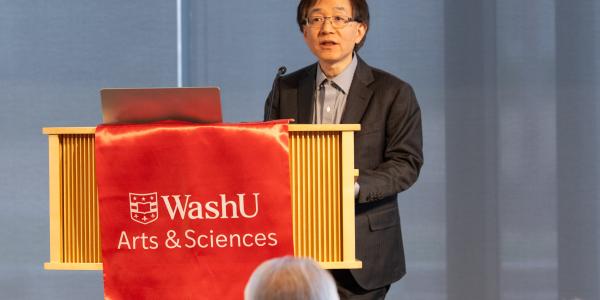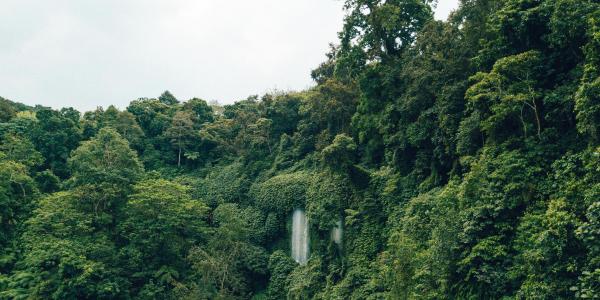During her installation ceremony on Oct. 16, Lúcia Lohmann, the George Engelmann Professor of Botany, delivered an address titled “Coming Full Circle: Reflections on a Botanical Journey.”

Lúcia Lohmann was installed as the George Engelmann Professor of Botany on Oct. 16. The program included a welcome from Feng Sheng Hu, the Richard G. Engelsmann Dean of Arts & Sciences and Lucille P. Markey Distinguished Professor; remarks from Jonathan Losos, director of the Living Earth Collaborative and the William H. Danforth Distinguished University Professor; and the installation and medallion ceremony by Dean Hu.
In her remarks, titled “Coming Full Circle: Reflections on a Botanical Journey,” Lohmann discussed how the chapters in her life and career coincided with exponential growth in the field of plant science and the evolution of her passion for the field of study. “I came to see botany not only as a science, but as a shared enterprise in service to life,” she said.
Lohmann is president of the Missouri Botanical Garden, a position that has historically come with a joint appointment as the George Engelmann Professor. “Together, these two institutions combine science, education, and action to illuminate the connections between plants, people, and our future,” she said.
Hu praised Lohmann’s scholarship and leadership and called her role a pivotal joint appointment for the region. “Lúcia is joining us at a critical moment for plant science here in St. Louis,” he said. “Her enthusiasm has begun to play a major role in revitalizing partnerships between the Garden and other research institutions, further strengthening St. Louis’ position as a hub for life sciences and biological conservation.”
Lohmann is one of two new biology hires with joint appointments at the Garden and WashU. Toby Pennington, a leader in the study of dry tropical forests, will be installed as the inaugural David and Dorothy Kemper Professor in the Department of Biology later this fall.
About Lúcia Lohmann
Lúcia Lohmann is the eighth president in the Missouri Botanical Garden’s 165-year history and the first woman to hold the position. At WashU she is the George Engelmann Professor of Botany in the Department of Biology in Arts & Sciences. Prior to returning to the Garden, Lohmann served as professor in the Department of Integrative Biology and Director of the University and Jepson Herbaria at the University of California, Berkeley.
Her research seamlessly integrates taxonomy, molecular systematics, ecology, and evolution, shedding light on the intricate processes shaping neotropical biodiversity. Lohmann’s work extends beyond academic boundaries, actively contributing to conservation efforts in Latin America. From 2012-2018, she led the Brazilian component of a project funded by the National Science Foundation, NASA and the São Paolo Research Foundation that sought to unravel the assembly of biodiversity within the Amazon basin over the last 30 million years. She is now co-principal investigator of the “Trans-Amazon Drilling Project (TADP): Origin and evolution of the forests, climate, and hydrology of the South American tropics,” a team effort that aims to bridge new data from geology, paleontology, and biology to understand the deeper history of the Amazon basin since the Cretaceous Period.
Her distinguished career is underscored by significant leadership roles in prestigious organizations. Dr. Lohmann previously served as president of the International Association for Plant Taxonomy and executive director of the Association for Tropical Biology and Conservation. Driven by her passion for research, capacity building, and science outreach, she achieved recognition through her election to the American Academy of Arts and Sciences in 2021. Before her tenure at UC Berkeley, Dr. Lohmann held a faculty position in the Department of Botany of the University of São Paulo. Her scholarly research and service contributions are equally impressive. Notably, she has served as a research associate at the Missouri Botanical Garden since 2004 and at the New York Botanical Garden since 2008. Her past editorial roles as associate editor for the journals Molecular Phylogenetics and Evolution, Taxon, Annals of the Missouri Botanical Garden, and Systematic Botany reflect her dedication to advancing the field.
Lohmann’s educational path includes the University of São Paulo, where she earned her bachelor’s degree in 1995. She went on to earn her master’s (1998) and doctoral (2003) degrees in ecology, evolution, and systematics from the University of Missouri-St. Louis. She further honed her skills during a post-doctoral fellowship at the Center for Conservation and Sustainable Development at the Missouri Botanical Garden in 2004. Her specialized focus lies in the Bignoniaceae, a tropical and subtropical plant family renowned for its resplendent, trumpet-shaped flowers and ecological significance. This botanical family also holds a key role in understanding the origin and evolution of biodiversity within neotropical forests. Lohmann employs a cross-taxonomic and multidisciplinary approach to explore the historical development of biotas, notably in the Amazon Basin and beyond.
About the George Engelmann Professorship
St. Louis businessman and philanthropist Henry Shaw established the Engelmann Professorship in 1885 in honor of Dr. George Engelmann, physician and botanist, who was also his close friend and adviser. As a rule, this position has been held by the director of the Missouri Botanical Garden. Also in 1885, he founded the Henry Shaw School of Botany at the university. Nineteen of the first 21 research doctorates conferred by WashU were earned in botany.
Born in Germany, Engelmann received his medical degree from the University of Wurzburg in 1831. However, his dissertation was devoted to plant morphology, specifically the study of aberrant and “monstrous” plant forms. He emigrated to America in 1833, arriving in Belleville, Illinois, to begin a small country practice in obstetrics. Two years later, he relocated to St. Louis, where he ran a thriving medical practice and devoted considerable time to collecting, describing, and systematizing the flora of the American West.
From 1856 until his passing in 1884, Engelmann was a WashU faculty member. He served as an invaluable counselor to Shaw as he transformed his estate into a botanical garden, encouraging him to develop it for both scientific value and public use. With Asa Gray, the renowned botanist at Harvard University, Engelmann undertook a mammoth-sized project to discover, describe, and categorize the entire flora of North America.
Additionally, Engelmann has been credited with playing a little-known role in rescuing the French wine industry. In the 1870s, the vineyards of France had been attacked by the insect pest Phylloxera, but Engelmann had noticed many wild vines in the Missouri region were resistant to these insects. The French government sent a scientist to St. Louis to consult with the Missouri state entomologist and Engelmann. He then arranged for millions of shoots and seeds of a wild vine native to the Mississippi Valley, Vitis riparia, to be collected and sent to France.
Engelmann was a member of scientific societies in both Europe and the United States. He was a founder and longtime president of the St. Louis Academy of Sciences, as well as a founding member of the National Academy of Sciences and the American Gynecological Society. His papers comprise 60 volumes in the library of the Missouri Botanical Garden. His plant collections, now at the garden, contain many of the “type specimens” for western plants, the specimens to which the scientific name of a plant is formally attached. Three plant genera and numerous species bear his name.





